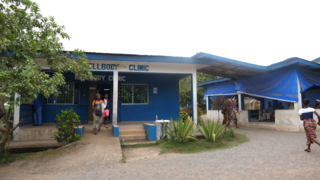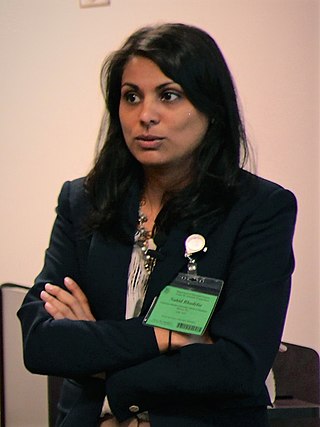Related Research Articles
International Medical Corps is a global, nonprofit, humanitarian aid organization that provides emergency medical services, healthcare training and capacity building to those affected by disaster, disease or conflict." It seeks to strengthen medical services and infrastructure in the aftermath of crises."

Wellbody Alliance is a 501(c)(3) registered nonprofit organization working to provide healthcare as a human right in Kono District, Sierra Leone. In addition to running a primary care facility, Wellbody operates a women's center and will open a birth center in 2015. They also focus on the prevention and treatment of HIV/AIDS and tuberculosis and provide medical services to amputee victims from the 11-year Sierra Leone Civil War. Their response effort during the Ebola virus epidemic in West Africa has received widespread media attention. These efforts include supporting four treatment facilities in rural Kono, house-to-house contract tracing and surveillance, the large-scale distribution of protective gear throughout Sierra Leone and an emphasis on sensitive community engagement to help stop the spread of the virus.
University of Makeni is the first private, Catholic, university located in Makeni, Sierra Leone.

The 2013–2016 epidemic of Ebola virus disease, centered in Western Africa, was the most widespread outbreak of the disease in history. It caused major loss of life and socioeconomic disruption in the region, mainly in Guinea, Liberia and Sierra Leone. The first cases were recorded in Guinea in December 2013; later, the disease spread to neighbouring Liberia and Sierra Leone, with minor outbreaks occurring in Nigeria and Mali. Secondary infections of medical workers occurred in the United States and Spain. In addition, isolated cases were recorded in Senegal, the United Kingdom and Italy. The number of cases peaked in October 2014 and then began to decline gradually, following the commitment of substantial international resources.

An Ebola virus epidemic in Sierra Leone occurred in 2014, along with the neighbouring countries of Guinea and Liberia. At the time it was discovered, it was thought that Ebola virus was not endemic to Sierra Leone or to the West African region and that the epidemic represented the first time the virus was discovered there. However, US researchers pointed to lab samples used for Lassa fever testing to suggest that Ebola had been in Sierra Leone as early as 2006.

An epidemic of Ebola virus disease in Guinea from 2013 to 2016 represents the first ever outbreak of Ebola in a West African country. Previous outbreaks have been confined to several countries in Sub-Saharan Africa.

An epidemic of Ebola virus disease occurred in Liberia from 2014 to 2015, along with the neighbouring countries of Guinea and Sierra Leone. The first cases of virus were reported by late March 2014. The Ebola virus, a biosafety level four pathogen, is an RNA virus discovered in 1976.

Organizations from around the world responded to the West African Ebola virus epidemic. In July 2014, the World Health Organization (WHO) convened an emergency meeting with health ministers from eleven countries and announced collaboration on a strategy to co-ordinate technical support to combat the epidemic. In August, they declared the outbreak an international public health emergency and published a roadmap to guide and coordinate the international response to the outbreak, aiming to stop ongoing Ebola transmission worldwide within 6–9 months. In September, the United Nations Security Council declared the Ebola virus outbreak in the West Africa subregion a "threat to international peace and security" and unanimously adopted a resolution urging UN member states to provide more resources to fight the outbreak; the WHO stated that the cost for combating the epidemic will be a minimum of $1 billion.

This article covers the timeline of the 2014 Ebola virus epidemic in West Africa and its outbreaks elsewhere. Flag icons denote the first announcements of confirmed cases by the respective nation-states, their first deaths, and their first secondary transmissions, as well as relevant sessions and announcements of agencies such as the World Health Organization (WHO), the U.S. Centers for Disease Control (CDC), and NGOs such as Doctors Without Borders; medical evacuations, visa restrictions, border closures, quarantines, court rulings, and possible cases of zoonosis are also included.
The following lists events that happened during 2014 in Sierra Leone.
The Ouse to Ouse Tock was a three-day quarantine in Sierra Leone from 19 September 2014 to 21 September 2014. It was part of an effort to combat the Ebola virus epidemic in Sierra Leone, part of the Ebola virus epidemic in West Africa. One of the goals was to cut down on transmission within families, so individual homes were visited. There was concern that some families were harboring Ebola cases and that there was a lack of knowledge about the disease.

The Ebola virus epidemic in West Africa has had a large effect on the culture of most of the West African countries. In most instances, the effect is a rather negative one as it has disrupted many Africans’ traditional norms and practices. For instance, many West African communities rely on traditional healers and witch doctors, who use herbal remedies, massage, chant and witchcraft to cure just about any ailment. Therefore, it is difficult for West Africans to adapt to foreign medical practices. Specifically, West African resistance to Western medicine is prominent in the region, which calls for severe distrust of Western and modern medical personnel and practices.(see Ebola conspiracies below.)

Ebola virus disease in the United Kingdom has occurred rarely in four cases to date, namely three health workers returning from treating victims of the Ebola virus epidemic in West Africa in 2014 and 2015, and a single case in 1976, when a laboratory technician contracted the disease in a needlestick injury while handling samples from Africa. All cases recovered. As of 2022, no domestic transmission of Ebola has occurred in the United Kingdom.

In late October 2014, the United Kingdom sent a hospital ship, the Royal Fleet Auxiliary's Argus, to help the aid effort against the Ebola virus disease epidemic in Sierra Leone. By late October Sierra Leone was experiencing more than twenty deaths a day from Ebola.

Kerry Town is a village in the Rural District in the Western Area of Sierra Leone. the town is located about 31 kilometres (19 mi) from the national capital, Freetown, which lies to the west-north-west. The population of Kerry Town is largely from the Krio ethnic group. The Treatment of the Ebola Virus clinic is located in Kerry Town.

Cases of the Ebola virus disease in Nigeria were reported in 2014 as a small part of the epidemic of Ebola virus disease which originated in Guinea that represented the first outbreak of the disease in a West African country. Previous outbreaks had been confined to countries in Central Africa.

In March 2014, the World Health Organization (WHO) reported a major Ebola outbreak in Guinea, a western African nation, the disease then rapidly spread to the neighboring countries of Liberia and Sierra Leone with smaller outbreaks occurring in Senegal, Nigeria, and Mali; the resulting West African Ebola virus epidemic is the largest Ebola outbreak ever documented.

Michael Joseph Ryan is an Irish epidemiologist and former trauma surgeon, specialising in infectious disease and public health. He is executive director of the World Health Organization's Health Emergencies Programme, leading the team responsible for the international containment and treatment of COVID-19. Ryan has held leadership positions and has worked on various outbreak response teams in the field to eradicate the spread of diseases including bacillary dysentery, cholera, Crimean–Congo hemorrhagic fever, Ebola, Marburg virus disease, measles, meningitis, relapsing fever, Rift Valley fever, SARS, and Shigellosis.

Nahid Bhadelia is an American infectious-diseases physician, founding director of Center for Emerging Infectious Diseases Policy and Research (CEID), an associate director at National Emerging Infectious Diseases Laboratories (NEIDL) at Boston University, and an associate professor at the Boston University School of Medicine. She currently serves as the Senior Policy Advisor for Global COVID-19 Response on the White House COVID-19 Response Team.

Ebola-chan is an Internet meme depicting a moe anthropomorphization of the Ebola virus and was popularized on 4chan. The first known image of Ebola-chan began on the Japanese social media site, Pixiv, in 2014. A few days after, it was posted 4chan's /pol/ thread, who began posting messages praising Ebola-chan. Soon after, 4chan users began spreading the meme to Nairaland, the largest online message board in Nigeria, accompanying images of Ebola-chan with racist messages and associated conspiracy theories. This included claims that Ebola was CIA-made and that white people were performing rituals for Ebola to spread. The meme's spread has been considered racist and has been attributed to increased mistrust between West Africans and medical professionals.
References
- ↑ "Exempt Organizations Select Check". irs.gov.
- ↑ "International Mutual Aid, Inc". Guidestar.org. Retrieved 2015-07-01.
- 1 2 "International Mutual Aid".